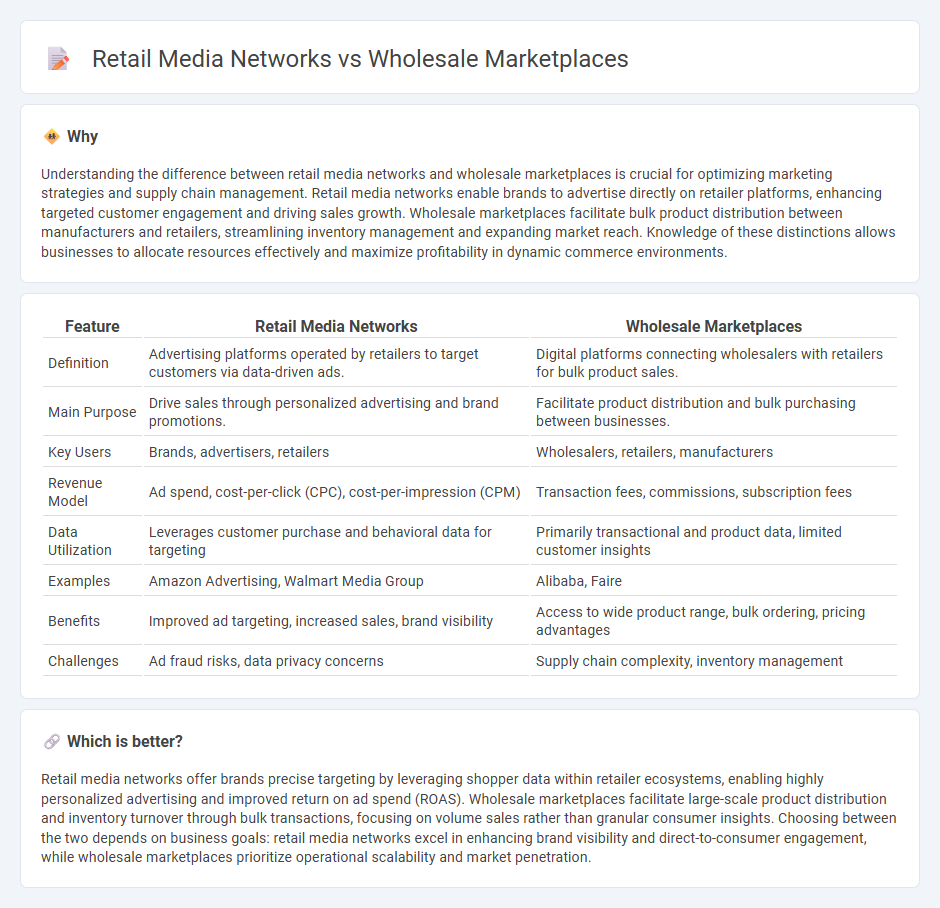
Retail media networks leverage retailers' digital platforms and consumer data to deliver targeted advertising, enhancing brand visibility and driving sales within the retail environment. Wholesale marketplaces connect manufacturers and bulk buyers directly, focusing on large-scale product distribution and efficient supply chain management. Explore the key differences and benefits of retail media networks versus wholesale marketplaces to optimize your commerce strategy.
Why it is important
Understanding the difference between retail media networks and wholesale marketplaces is crucial for optimizing marketing strategies and supply chain management. Retail media networks enable brands to advertise directly on retailer platforms, enhancing targeted customer engagement and driving sales growth. Wholesale marketplaces facilitate bulk product distribution between manufacturers and retailers, streamlining inventory management and expanding market reach. Knowledge of these distinctions allows businesses to allocate resources effectively and maximize profitability in dynamic commerce environments.
Comparison Table
| Feature | Retail Media Networks | Wholesale Marketplaces |
|---|---|---|
| Definition | Advertising platforms operated by retailers to target customers via data-driven ads. | Digital platforms connecting wholesalers with retailers for bulk product sales. |
| Main Purpose | Drive sales through personalized advertising and brand promotions. | Facilitate product distribution and bulk purchasing between businesses. |
| Key Users | Brands, advertisers, retailers | Wholesalers, retailers, manufacturers |
| Revenue Model | Ad spend, cost-per-click (CPC), cost-per-impression (CPM) | Transaction fees, commissions, subscription fees |
| Data Utilization | Leverages customer purchase and behavioral data for targeting | Primarily transactional and product data, limited customer insights |
| Examples | Amazon Advertising, Walmart Media Group | Alibaba, Faire |
| Benefits | Improved ad targeting, increased sales, brand visibility | Access to wide product range, bulk ordering, pricing advantages |
| Challenges | Ad fraud risks, data privacy concerns | Supply chain complexity, inventory management |
Which is better?
Retail media networks offer brands precise targeting by leveraging shopper data within retailer ecosystems, enabling highly personalized advertising and improved return on ad spend (ROAS). Wholesale marketplaces facilitate large-scale product distribution and inventory turnover through bulk transactions, focusing on volume sales rather than granular consumer insights. Choosing between the two depends on business goals: retail media networks excel in enhancing brand visibility and direct-to-consumer engagement, while wholesale marketplaces prioritize operational scalability and market penetration.
Connection
Retail media networks leverage data and advertising opportunities within retail environments, enhancing brand visibility and customer targeting. Wholesale marketplaces provide the bulk inventory and B2B transactions that support product availability for retailers, creating a critical supply chain link. Integration of retail media networks with wholesale marketplaces drives synchronized marketing strategies and inventory management, boosting overall commerce efficiency.
Key Terms
B2B (Business-to-Business)
Wholesale marketplaces facilitate bulk transactions between manufacturers and retailers, enabling businesses to source products efficiently at competitive prices. Retail media networks leverage retailers' digital platforms to offer targeted advertising opportunities, enhancing B2B brand visibility and driving sales through data-driven audience insights. Explore the advantages and strategic applications of wholesale marketplaces and retail media networks in B2B to optimize your business growth.
Ad Inventory
Wholesale marketplaces offer bulk ad inventory to buyers, enabling scalability and cost efficiency, often appealing to brands seeking wide reach at lower CPMs. Retail media networks provide premium, highly targeted ad inventory leveraging first-party shopper data, resulting in better audience precision and higher ROI. Explore how these distinct ad inventory strategies can influence your advertising effectiveness and budget allocation.
Consumer Targeting
Wholesale marketplaces aggregate large inventories from multiple suppliers, enabling broad consumer targeting through diverse product selections and competitive pricing. Retail media networks leverage first-party shopper data and advanced analytics to deliver highly personalized ads, enhancing consumer engagement and conversion rates. Explore how these distinct approaches optimize consumer targeting strategies in modern commerce.
Source and External Links
How To Find Wholesale Suppliers (2025) - Discusses top wholesale marketplaces including Shopify Collective, Alibaba/AliExpress, DHgate, EK Wholesale, Faire, Wholesale Central, and IndiaMart, highlighting unique features like pay-after-sale options and access to global suppliers.
13 Best Wholesale Marketplaces for Selling Products - Lists specialized wholesale marketplaces such as Go Wholesale for refurbished electronics and Wholesale Clearance UK for liquidation sales, providing details on fees, shipping, and seller requirements.
Top 5 Wholesale Marketplaces To Grow Your Business - Covers prominent digital wholesale marketplaces including FashionGo, Faire, OrderChamp, RangeMe, and Brandboom, emphasizing their features, pros and cons like payment terms, fees, and marketplace policies.
 dowidth.com
dowidth.com